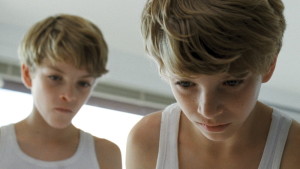 Review: One Night Only
Review: One Night Only
Goodnight Mommy | Veronika Franz and Severin Fiala | Austria | 2014 | 100 minutes
WUD Marquee Film Festival, Union South Marquee Theater, Saturday, November 14, 11:30pm»
New Madison Film Forum contributor Erik Oliver admires the arresting aesthetics of the Austrian thriller, Goodnight Mommy, but argues that the film falls short of similar recent thrillers that exploit high-concept horror conventions and familial subtext.
At first glance, the new Austrian thriller by Veronika Franz and Severin Fiala seems to belong to the current wave of high-concept, richly subtextual horror that’s brought us some of the most striking chillers of the past year. Goodnight Mommy aspires to sit on the same shelf with the dreamy, dread-soaked Carpenter throwback It Follows; the fascinating, flawed Cronenbergian love story Spring; and the expressionistic, nightmarish The Babadook. Goodnight Mommy most clearly recalls the last film, with its similar themes of parental anxiety and twisty awareness of audience identification. Yet where these films dig deep into pulp ideas for the deeper resonances within, Goodnight Mommy goes for more straightforward—and ultimately less satisfying—chills.
Goodnight Mommy begins with Lukas and Elias, eleven-year old twins (played by Lukas and Elias Schwarz, in a discomfitingly meta touch) freely wandering the outdoors of their rural Austrian home. They seem to live a fairy-tale existence, roaming their picturesque surroundings to play games, jump on a trampoline, and collect the most hideous bugs imaginable (as you do). The boys are seemingly untethered from any kind of adult influence, until a car pulls into the front driveway, and they rush back to the house to greet it.
Their mother (Susanne Wuest) has just arrived home from reconstructive facial surgery, her head tightly wound with bandages that only partially conceal the bruising underneath. Her appearance is alienating, but she also seems different—colder than before. Her strict authoritarian parenting style doesn’t do much to comfort the boys. Then, on the night of their chilly reunion, they play a game of Twenty Questions (the European variant American audiences will recognize from Inglourious Basterds). The boys stick a gimme to her forehead: “Mama.” But the game stretches on, and she can’t get the right answer, eventually exclaiming she doesn’t know who she is. Neither, it turns out, do the boys. Nor do we.
The tension builds from there, as the boys become increasingly suspicious of their mother, and their mother becomes increasingly harsh in her discipline. Goodnight Mommy hinges on a pretty interesting structural and thematic inversion, one that doesn’t really become apparent until around halfway through. To put it carefully, this is not the movie you might think it is from its trailer or its premise. What’s really going on here sinks in unnervingly slowly; this is the kind of horror film that builds, and builds, and builds, and builds, until all of a sudden it unleashes its assaultive, bracingly cruel conclusion. By that point, the mechanisms of plot don’t really matter; you’ve already been broken beyond the point that you’ll care.
Goodnight Mommy is a nasty little movie, but at the same time it’s hard to look away, because what’s onscreen is so often arresting. Shooting in “glorious 35mm,” as the credits boast, Franz and Fiala populate their film with alternately sumptuous and crushing imagery. The outdoor photography is stunning—these are, after all, the same hills Maria and the von Trapps once filled with the sound of music. The sun-soaked images serve as a visual foil for the monochromatic interiors of the family’s house, a steely modernist cage that calls to mind Boris Karloff’s abode in The Black Cat. The interior images are imposing, even when nothing openly unsettling is happening.
Everything seems just slightly off in this isolated little world: caves full of human remains are observed without comment; inky, blurred portraits hang on the walls; something sinister could always be lurking around a brightly-lit corner. Goodnight Mommy is beautiful to look at, in ways that perfectly compliment its opposing characters and nightmarish dread.
But those aesthetics, as great as they are, are also the most compelling aspect of Goodnight Mommy. As gorgeous and as tense as the film can be, once the final credits roll, there isn’t a lot to chew on. As more time passes, more reasons arise to question the whole experiment. With its flawless imagery, the movie remains effective as an ice-cold thriller, yet it all feels a bit hollow. There’s been much discussion of the film’s big third act twist, which your smug buddies will boast about knowing all along. But by the time the revelation comes, the movie’s gone far beyond the point that it makes any difference. When it drops, it’s meaningless, both as contextualization and as shock.
Where the other horror movies of this recent wave start with a high-concept but keep finding new angles and depths to explore, Goodnight Mommy becomes less interesting the more it transforms before our eyes. Franz and Fiala have spoken in interviews about their desire to make “cinema that attacks you,” and their movie certainly does that. But is that enough?
Goodnight Mommy doesn’t embrace ambiguity, or make much of its limited thematic ideas. It’s admirable in how it plays with your expectations, but doesn’t seem to do so for any greater purpose. Franz and Fiala fill the film with motifs and hints of bigger ideas, but never quite integrate them into a meaningful statement.
Goodnight Mommy gets cruel, but without any ideas backing up that cruelty, it all feels more like an experiment than a movie; a pretty thing to look at, but which offers little more once the screen goes to black.